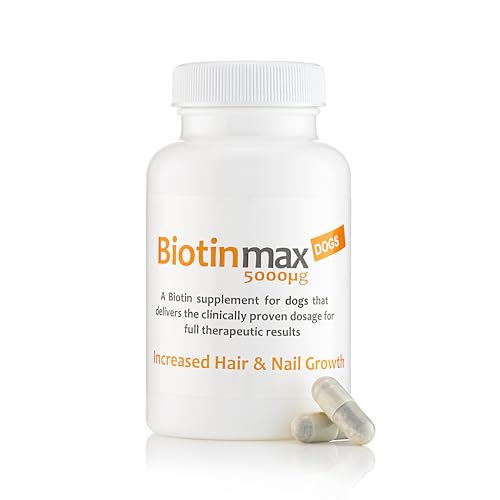Understanding Biotin: What It Is and Why Your Dog Needs It
What is Biotin?
Biotin is a water-soluble vitamin that plays an essential role in maintaining your dog’s overall health. It’s part of the B-vitamin complex, often referred to as vitamin H or B7. This vitamin is crucial for various metabolic functions, including converting nutrients into energy and supporting the synthesis of fatty acids. Without enough biotin, your dog may experience a range of health issues.
Why Do Dogs Need Biotin?
Dogs, like humans, require a balanced diet to thrive, and biotin is a vital component of that diet. It supports healthy skin and fur, promotes proper metabolism, and contributes to vibrant energy levels. Without sufficient biotin, dogs can develop deficiencies that might lead to dry skin, dull fur, or even more serious health complications.
Benefits of Biotin for Dogs: From Coat Health to Joint Support
Coat and Skin Health
One of the most recognized benefits of biotin is its ability to promote a shiny, healthy coat. Dogs lacking biotin often suffer from dry, flaky skin and excessive shedding. By ensuring they receive enough biotin, we can help maintain their fur’s shine and softness, contributing to overall aesthetics and comfort.
Joint and Bone Support
Biotin is also linked to healthy joint and bone development in dogs. As our furry friends age or engage in high levels of physical activity, biotin can support the development and maintenance of healthy joints, potentially reducing the risk of conditions like arthritis. This support can lead to more active lifestyles and improved mobility.
How to Choose the Right Biotin Supplement for Your Dog
Assessing the Form of Biotin
When selecting a biotin supplement for your dog, it’s essential to consider the form it comes in. Biotin is available in various forms, such as chewable tablets, powders, or even liquids. Depending on your dog’s preferences and ease of administration, one form might work better than another. Chewable tablets may be ideal for picky eaters, while powders can be easily mixed into food.
Checking the Ingredients
It’s crucial to review the ingredients list on the supplement label. We should look for high-quality biotin supplements that have minimal fillers and additives. Supplements containing additional vitamins, minerals, or omega fatty acids can also provide added health benefits. Make sure to choose a product specifically designed for dogs to ensure safety and efficacy.
Incorporating Biotin into Your Dog’s Diet: Tips and Tricks
Adding Biotin-Rich Foods
Incorporating biotin-rich foods into your dog’s diet can be an excellent way to boost their biotin intake naturally. Foods like eggs, fish, nuts, and certain vegetables, such as sweet potatoes and spinach, are high in biotin. If your dog enjoys these foods, supplementing their diet with a variety of these options can enhance their overall nutrition.
Mixing It Up with Supplements
If you’re using a biotin supplement, mixing it with your dog’s regular meals can be an effective strategy. Whether you choose a powder or add a chewable tablet into their food, most dogs won’t notice the difference. Consistency is key, so aim to establish a daily routine in which biotin is part of their meals.
Signs Your Dog Might Need More Biotin
Observing Physical Changes
If you notice changes in your dog’s coat texture or skin condition, it may indicate a biotin deficiency. Signs like excessive shedding, dull fur, or flaky skin can mean it’s time to consider their biotin intake. Additionally, changes in energy levels can also be a sign that your dog needs more nutritional support.
Monitoring Overall Health
Besides visible changes in fur and skin, we should look for other symptoms such as dry or cracked paws, which can signal that your dog may benefit from a boost in biotin. Monitoring their general health and behaviour is essential for identifying potential deficiencies before they lead to more serious issues.

















